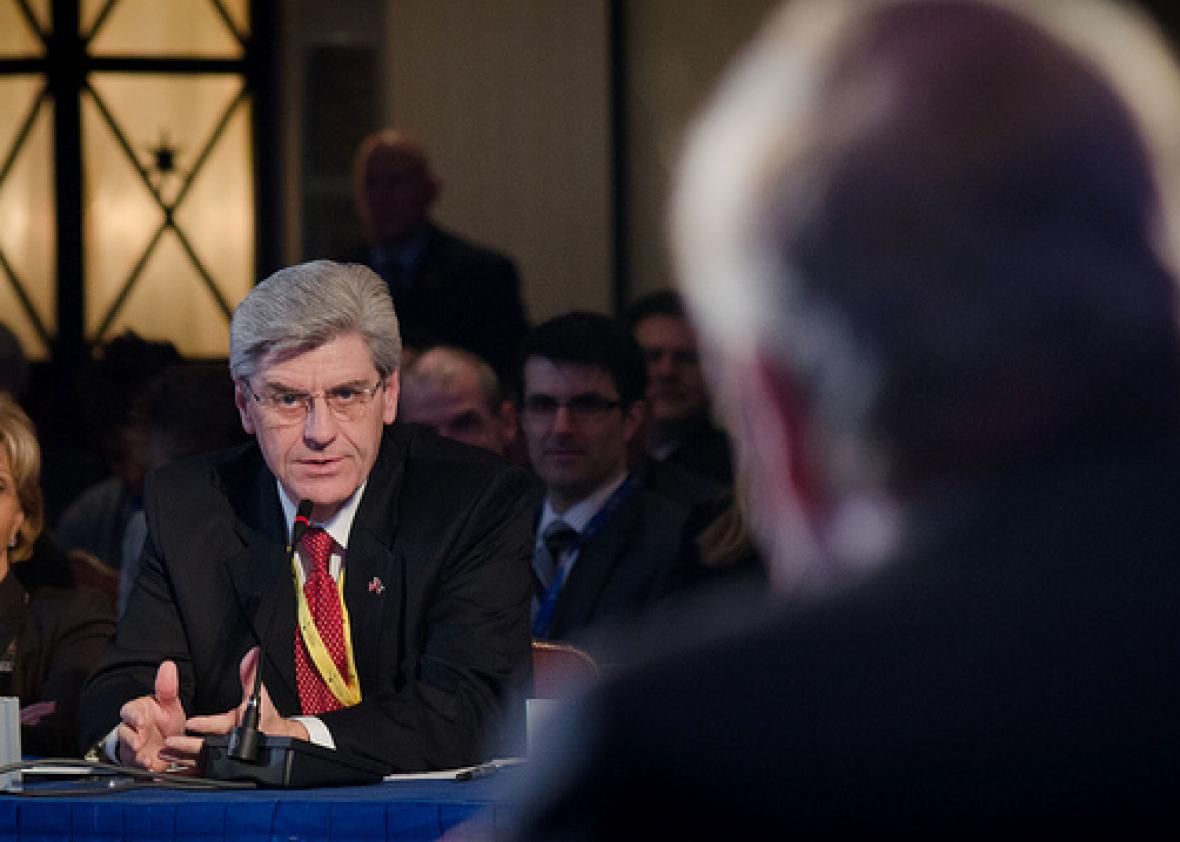Last April, in response to the Supreme Court’s decision invalidating same-sex marriage bans, Mississippi did something interesting: It singled out three specific anti-LGBTQ religious beliefs and provided them with legal protections far beyond what all other religious beliefs receive. Under the Mississippi law, anyone whose religion compelled them to oppose same-sex marriage, same-sex intimacy, or gender noncomformity was free to discriminate against LGBTQ people in housing, employment, and medical treatment. Anti-LGBTQ businesses could refuse to serve gay people; anti-LGBTQ adoption agencies—private and state run—could turn away same-sex couples; anti-LGBTQ clerks and judges could refuse to marry same-sex couples.
Those with different religious beliefs got no such protections. Only anti-LGBTQ religious convictions, Mississippi announced, deserved the legal right to discriminate. Hours before the law was set to take effect, U.S. District Judge Carlton Reeves issued an injunction, holding that the statute likely violated the U.S. Constitution. Now Mississippi is appealing that decision to the U.S. Court of Appeals for the 5th Circuit. But a new brief by Roberta Kaplan—the attorney who toppled both DOMA and Mississippi’s anti-gay adoption law—lays bare the statute’s constitutional defects with such acuity that even the conservative 5th Circuit may find it impossible to disagree.
The chief problem with the Mississippi law, known as HB 1523, is that it simply cannot be squared with the First Amendment. Under the First Amendment’s Establishment Clause, the government is barred from passing any law “respecting an establishment of religion.” A government action runs afoul of the Establishment Clause when it endorses religion; favors one religion or religious belief over others; or accommodates religion in a way that imposes significant burdens on third parties.
HB 1523 does all this and more. As Kaplan’s brief explains, the Mississippi legislature explicitly declared that its bill was an effort to shield those who “claim to be Christians.” (“I pledge to protect the rights of Christian citizens,” announced one vigorous legislative supporter of HB 1523.) The legislature effectively endorsed Christianity by granting special legal protections to specific Christian beliefs. Even worse, the legislature announced its preference for a certain form of Christianity, one that opposes same-sex marriage and gender nonconformity—unconstitutionally taking a position on a denominational dispute and favoring one side of the sectarian debate over another. And by affording holders of anti-LGBTQ beliefs the absolute and unqualified right to discriminate, Mississippi seriously disadvantaged LGBTQ people. This burdening of nonbelievers to protect preferred beliefs clearly contravenes the Establishment Clause.
Because HB 1523 never actually took effect, none of the plaintiffs challenging its constitutionality have directly suffered from the discriminatory harms it attempts to inflict. Theoretically, that might present a problem with “standing,” those rules governing who is authorized to challenge a certain law. But luckily, individuals have standing to bring Establishment Clause challenges when a government’s endorsement of religion stigmatizes, marginalizes, or excludes them because they do not adhere to the state’s preferred faith. The plaintiffs challenging HB 1523, some of whom are faith leaders themselves, fit this bill neatly, resolving any potential standing issues that the 5th Circuit could otherwise use to throw out the case.
Kaplan’s brief presents a thorough and persuasive explanation as to why HB 1523 so obviously “respect[s] an establishment of religion.” The ultimate question, of course, is whether the courts will agree—including, possibly, the Supreme Court, and the perennial swing vote, Justice Anthony Kennedy. The odds, I think, are in Kaplan’s favor. Establishment Clause jurisprudence can be murky and complex, and Kennedy is no flaming church-state separatist. But if this law does not violate the Establishment Clause, then it is hard to think of one that does, outside of the literal declaration of a state religion. Protecting LGBTQ rights in the age of Trump won’t be easy. But Kaplan’s brief demonstrates how enduring constitutional principles can continue to protect the equal dignity of every American.
